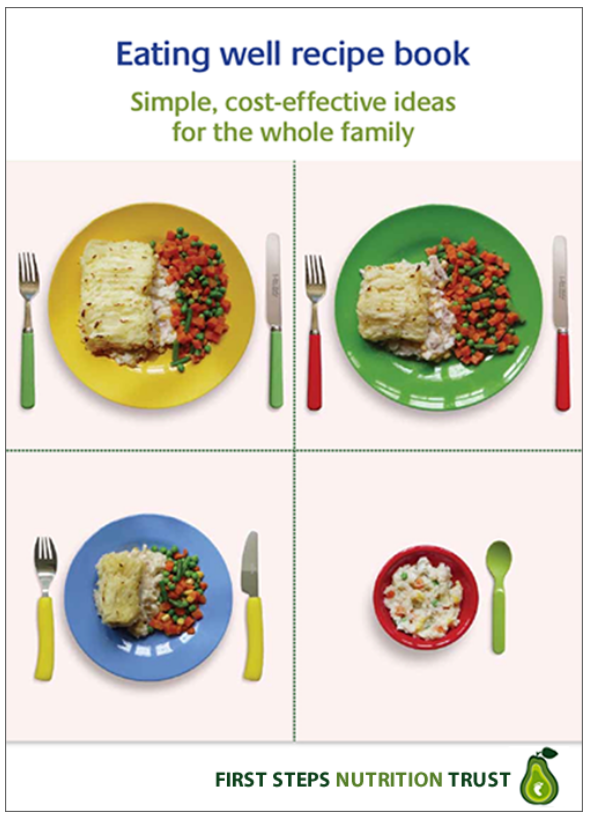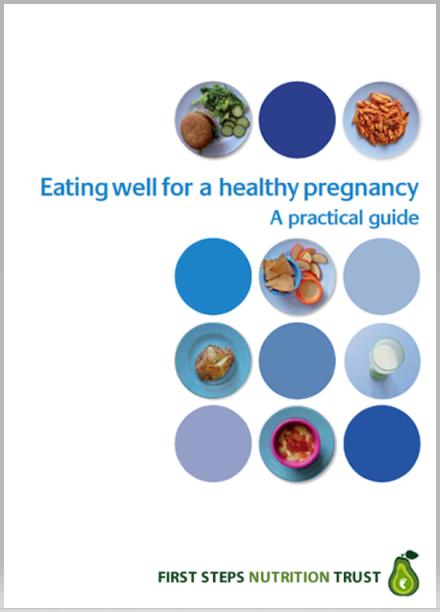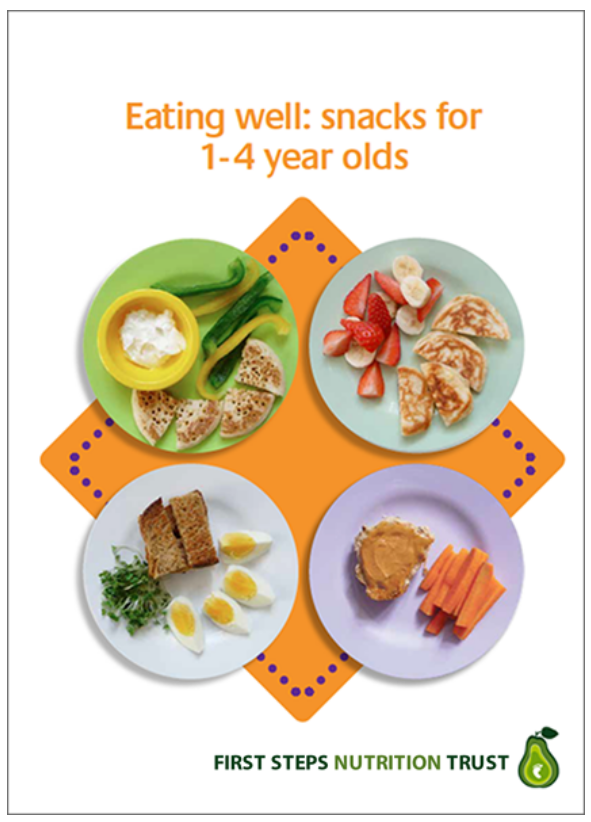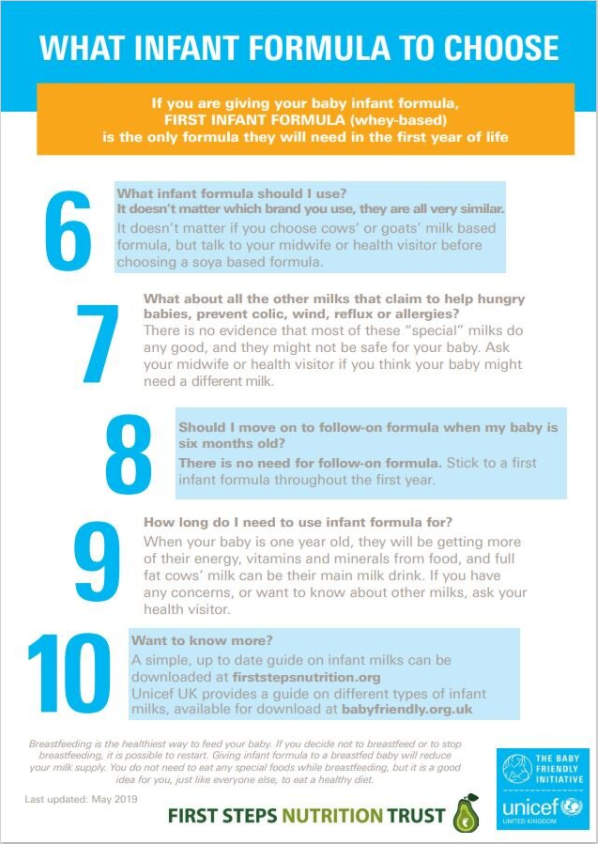May 2022
We hope you’ve all had a good month and have enjoyed the sunshine amid the showers. We’ve been really busy with all that has been going on, so have a lot to share in this bumper newsletter. In ‘News’ we share with you our briefing paper on the implications of the ‘Cost of Living Crisis’ for the diets of infants and young children, and our policy recommendations and key messages for health care professionals working with young families; we report on the Government’s U-turn on promised advertising restrictions for HFSS-foods; and we share a new report by the Parent Infant Foundation: “Why Health Visitors Matter”. In ‘Infant Milk news’ we share what we know about unavailable products, highlight some new FAQs about the safer preparation of powdered infant formula and formula feeding (prepared just in time for World Food Safety Day) and we share our thoughts on what the US formula shortages mean for the UK. As secretariat of the Baby Feeding Law Group UK we share with you how the UK’s laws governing the marketing of breast-milk substitutes are rated in the brand new 2022 “Status of the Code” report. Lastly, we share some details of the forthcoming ‘National Breastfeeding Week’.
News
Implications of the ‘Cost of Living Crisis’ for the diets of infants and young children in the UK, and recommendations for policy and practice
Briefing paper and policy recommendations:
In response to the rising cost of living and food insecurity, this month we produced a briefing paper to highlight the specific food and nutrition vulnerabilities of infants and young children. In it we emphasize how the exploitative marketing of infant milks and of commercially-produced foods for infants and young children may lead households to purchase more expensive products at no nutritional benefit to their child. We make eight policy recommendations, mostly focused on ensuring accessibility of infant formula for low-income, formula-feeding families but also to tackle inappropriate marketing and to improve the food offer in early years settings. We welcome you to share this briefing paper and our recommendations widely.
Read the briefing paper here.
Guidance for health care professionals working with young families looking to cut costs:
As the cost of living continues to increase, it is even more pertinent to counter the inappropriate marketing of commercial products aimed at infants and young children with the provision of independent advice to help households make a more informed decision on how they feed their children, given their means. Health care professionals have a role to promote and support mothers who can and want to, to breastfeed, and among health benefits there are likely cost savings for their households if they can be supported to meet their breastfeeding goals. Health care professionals can also signpost eligible families to the Healthy Start/Best Start Foods schemes. In addition to such actions, here are some suggested messages for health care professionals to share with families looking for ways to reduce their outgoings:
Some messages for families with babies:
1. There is no ‘best infant formula’ so you don’t need to buy an expensive product
All first infant milks must meet UK legal measures regarding nutritional composition, so the large cost differences between products do not translate in to health or nutrition benefits, regardless of what company marketing claims.
If parents are interested in potential cost savings related to their formula choice, health care professionals can look up the cheapest infant milks currently available on the UK market here and advise them accordingly.
Parents can be directed to information on how to choose a formula here.
2. Specialist infant milks marketed as ‘Foods for Special Medical Purposes’ (FSMP) are more expensive than infant formula, they may cause harm and they may not be effective. Only use an FSMP on the advice of a health care professional
Buying a specialist infant milk over the counter instead of infant formula can cost between £16.50 and £198 more in the first 6 months. However, despite being freely available on supermarket and pharmacy shelves and heavily promoted to health workers, specialist infant milks marketed as FSMPs should only be used under medical supervision – as clearly stated on their labels. This would ensure that the formula is effective (because many are not evidence-based) and appropriate for your baby, and that potential harms are minimised as well as ensuring the extra cost you’re incurring (unless you can get the formula on prescription) can be justified.
More information on specialised milks can be found here.
3. Your baby doesn’t need snacks – especially ones from packets
Between about 6 and 12 months of age, the NHS advises that babies should progress from eating a few spoonfuls of healthy foods, to three healthy meals a day, in between which they should be given only water and their usual milk (breastmilk or infant formula). Babies should not be given snacks as these will fill them up and displace the nutrients provided by the meals and the milk feeds. Commercially-produced snacks marketed for babies are completely unnecessary as well as expensive. Because of a lack of regulations they are typically marketed as healthy when they are likely to be ‘ultra-processed’, may contain a lot of sugar and are not a good source of the nutrients babies need for their growth and development.
Some messages for families with toddlers:
4. Growing-up milks and toddler milks are unnecessary and cows’ milk is a cheaper and better choice
Many formula companies extend their formula product ranges by selling products labelled as ‘stage 3’ and ‘stage 4’ formulas, marketed for feeding toddlers and pre-school children. These are not subject to any regulations with regards to their composition, marketing or labelling and the NHS judge them to be unnecessary. If used daily, they could typically provide 400-500g of extra sugar a month to your child’s diet and would cost 2-3 times as much as an equivalent amount of cows’ milk.
Health care professionals can read more about these products here and animal milk and plant milk alternatives to cows’ milk here and here.
Some messages for pregnant women and young families:
5. Healthy Start/Best Start vitamins can help ensure adequate intakes of at risk vitamins
If you are eligible for one of these schemes, you should be able to access the cash allowance to buy nutritious foods, but as well, vitamin drops (to be taken by pregnant and breastfeeding women and babies and young children as directed). It is important to use these supplements as advised, as they contain the vitamins which are commonly lacking in the diet, particularly among those with extra nutrient needs, including young children. This is even more pertinent given the negative impact the cost of living crisis is having on the quality of many people’s diets
NHS Healthy Start vitamin tablets and vitamin drops can be accessed using the Healthy Start Card for free. More information on eligibility criteria and how to access Healthy Start vitamins can be found here.
In Scotland, Healthy Start vitamins are available for free to:
breastfeeding women and children up to 3 years of age (vitamin D supplements)
(Midwifes and health visitors are able to instruct on how to access these vitamins as there are different arrangements in different areas of Scotland).
6. For ideas on how to eat well on a budget see First Steps Nutrition Trust resources
We appreciate that the rising cost of fuel and food, alongside squeezes in incomes and benefits make it a particularly challenging time to try to eat healthily. First Steps Nutrition Trust provides a range of ‘Eating Well’ guides with advice and costed recipes appropriate for babies, children aged 1-4, pregnant women and young families. It’s important to remember that from one year of age, toddlers and pre-school children can eat appropriate family foods, which as well as being nutritious are likely to be more cost-effective than commercial products marketed for toddlers, like packets of snacks and children’s ready meals.
You can read/download our Eating Well guides for free here.
Government U-turn on ‘HFSS’ advertising: Seeking your help!
The Government recently passed laws to introduce a 9pm TV watershed and total online restriction for advertising high fat, salt and/or sugar products (HFSS). It was also planning to restrict ‘junk food’ multibuy promotions from October 2022. However, mid-month the Government executed a U-turn, delaying these interventions to protect children's health for a year. These restrictions are evidence based: the more children watch ‘junk food’ ads, the more of that ‘junk food’ they want. In the midst of a cost of living crisis, multi-buy offers trick us into spending 20% more, not less: they’re bad for our wallets and bad for our health. However, it's not too late for the Prime Minister to reconsider. Sustain, Jamie Oliver and others are leading a growing movement calling on the Government not to U-turn on this important action to better protect child health. Please help by writing to your MP to ask them to tell Boris to put children’s health before politics.
NEW Parent-Infant Foundation report: “Why Health Visitors Matter: Perspectives on a widely valued service”
Earlier this month, the Parent-Infant Foundation published this new report bringing together evidence and reflections on the vital role of health visitors from parents, and professionals, including our director, Dr Vicky Sibson.
The report notes that there has been a 30% reduction in the health visiting workforce since 2015. In a context where many women want to breastfeed but fail to meet their breastfeeding goals, reductions in the health visiting workforce is worrying news as fewer new mums will have timely access to breastfeeding support and advice. Health visitors also provide evidence-based advice on other aspects of infant and young child feeding, countering the exploitative marketing of food and drink for babies and toddlers that pressures households into purchasing inappropriate, unnecessary and costly foods and drinks. However, service cuts have meant that this support from health visitors isn’t always available. A recent survey commissioned by OHID found that 59% of parents of 3-18 month olds wanted professional advice and support for introducing solids, but only 30% received this advice from a health visitor.
At a time where the cost of living is rising and obesity rates among young children are at their highest recorded levels, this report is a timely reminder of the vital role that health visitors play in providing expert and independent advice and support to parents as they seek to provide the best food and nutrition for their infants and young children. First Steps fully supports the Parent-Infant Foundation’s calls for proper resourcing for the health visiting service, ensuring that all households can access the advice and support they need at this critical period in a child’s life.
You can read the full report here.
Infant Milk News
Unavailable products
Some infant milk products are not currently available for purchase either from the manufacturer’s website, or as far as we can see online, from retailers’ websites or in store. These include Kendamil Medi+ Anti Colic, which the manufacturer informs us is being reformulated, and the Piccolo Organic range of infant milks. The Piccolo website simply states that the products are out of stock and the manufacturer has not informed us whether or not they have been discontinued or alternatively, when they will be back in stock. We will provide any updates we receive in subsequent newsletters.
New FAQs on infant milk safety
The 7th of June is “World Food Safety Day”. This annual campaign and celebration aims to draw attention and inspire action to help prevent, detect and manage foodborne risks.
This year the theme is “Safer food, better health”, highlighting the role that safe and nutritious food plays in ensuring human health and well-being. This could not be more relevant to our work currently, given the potential for the rising cost of formula to lead families to implementing unsafe feeding practices such as watering down formula milk, and formula shortages in the US having the same effect (see more on the US situation below). Whilst we cannot fully predict changes in the global supply chain, domestically we can protect infants from food contamination by ensuring that infant milks are prepared, stored and handled safely according to the NHS guidance.
In order to answer some of the questions you have been asking us about the safe preparation and storage of infant milk, particularly with respect to new formula preparation devices and storage of different types of infant formula milks, we have updated the questions about infant milk safety in the FAQs section of our www.infantmilkinfo.org website.
Amongst others, you can find answers to the following questions here.
- Are rapid cooling devices safe to use when preparing powdered infant formula?
- Is filtered water safe to use for preparing powdered infant formula?
- How long can I store ready to feed (RTF) infant milks once opened?
US formula shortages: Implications for UK families
The acute formula supply problems facing families in the US have been making UK news, and we’ve been giving some thought to the potential implications for UK families. Vitally, we’re not aware of any impact on the availability of formula in the UK (a message reiterated by DEFRA in a recent response to a parliamentary question). The reports we have read of supplies being redirected from Europe have been related to specific specialised infant milks and in the context of the manufacturer increasing their production, as opposed to diverting existing stocks. Given the root cause of the shortage being health and safety breeches in one US formula production facility leading to the bacterial contamination of products from that plant, there does not seem to be immediate cause for concern in the UK.
This unfortunate crisis serves to remind us how ongoing work to enable women who can and want to, to breastfeed, is as important as ever. And for those women and families who cannot breastfeed, who choose not to, or whose breastfeeding journey ends sooner than they might have liked, there are several relevant messages on formula choice and preparation (which overlap to some extent with the cost saving messages shared above):
1. No powdered infant formula is sterile, and the only way to kill any potentially dangerous bacteria in the powder is to follow the NHS instructions for making up formula which, critically, includes using water at a temperature of no less than 70˚C.
2. Among healthy, non-breastfed/partially breastfed babies between birth and 12 months of age (after which formulas are unnecessary), all infant formula brands are interchangeable, because the law requires that they all comply with the same nutrition composition standards. This means that all infant formulas can meet a healthy baby’s nutrient requirements for adequate growth and development and none confers any health or nutrition benefits over another, regardless of what the marketing messages may claim.
3. Follow-on formula marketed for use from 6-12 months old should never be given to a baby under 6 months of age as it could be harmful for them. It is also unnecessary for a baby from 6-12 months of age where infant formula is available.
4. Specialised infant milks marketed as ‘Foods for Special Medical Purposes’ should only be used following the advice of a medical professional - as stated on the label - as they may cause harm and/or lack evidence for effectiveness.
5. Infant milks marketed as ‘Growing up’ milks or toddler milks for use from 12 months of age should not be given to infants under 12 months of age as they could be harmful for them. These products are not subject to any laws with respect to their composition, marketing or labelling and they contain a lot of sugar as well as being expensive (you can read more about them here). These products are unnecessary and the NHS advises young children should be given cows’ milk to drink.
Guidance for parents/carers on choosing a formula can be found here.
Looking for information about infant milks? Check out our website www.infantmilkinfo.org. Still got questions about infant milks? Contact susan@firststepsnutrition.org
Baby Feeding Law Group news
An assessment of the implementation of the International Code of Marketing of Breast-milk Substitutes in the UK, extracted from the 2022 Status Report
Earlier this month, WHO, UNICEF and IBFAN released their latest global status report on the national implementation of the International Code of Marketing of Breast-milk Substitutes (BMS) and subsequent relevant World Health Assembly (WHA) resolutions (collectively referred to as ‘the Code’), presenting data on 149 countries including the UK.
The report supersedes the 2020 report, since when significant contextual changes have occurred, including the COVID-19 pandemic which many formula companies were shown to exploit for marketing purposes. There has also been an increase in the use of digital media for advertising, which has been extensively analysed by the WHO report launched last month.
In order to systematically and objectively assess implementation of the Code, the report uses an algorithm that measures legislative adherence to each Code provision, ranking countries in to one of four descriptive categories. The UK scores 40/100 and is described as “some provisions of the Code included”. Key weaknesses include that legislation only applies to BMS for infants under 12 months (e.g. not to ‘growing up’ or ‘toddler’ milks), legislation does not prohibit promotion of BMS in the health system and compliance with legislation is not monitored or properly enforced.
The report recommends that countries, including the UK, with few legislative provisions of the Code, should analyse and address weaknesses or gaps in their existing legislation and take action to update their legal measures. The BFLG-UK recently commissioned a consultant-led piece of work to undertake this analysis and aide advocacy towards legislative change, and we will keep you informed of our progress in future newsletters.
The 2022 status report on National implementation of the International Code can be found here.
You can follow the work of the Baby Feeding Law Group on twitter @BflgUK
Forthcoming
National Breastfeeding Week, 27 June – 3 July 2022
Better Health - Start for Life are running a campaign to celebrate this year’s National Breastfeeding Week, for which the theme is 'Everyone has a part to play in helping mums to breastfeed'.
The key focus will be on the difference that can be made if everyone supports breastfeeding, including the mother’s partner, the wider family, the community, health and education services and workplaces. We hope you may find a way to participate and promote the messages.
